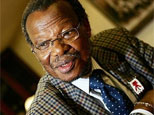Africa urged to break deafening silence on AIDS

South Africa's veteran Zulu leader Mangosutho Buthelezi
Buthelezi, who has lost two children to AIDS, says the pandemic-blighted continent should stop sweeping the disease under the carpet.
The 78-year-old leader, who caused ripples in South Africa by announcing that two of his children had succumbed to the disease, said the stigma and taboos surrounding the disease in Africa must be lifted as soon as possible.
"We have no alternatives. If we want our people to survive, if we want to get over this pandemic, we have to become upfront, open about it, including about sexuality," he told AFP in an interview.
Africa is the world's AIDS epicentre and clocked up some two million AIDS deaths last year.
Around 5.5 million of South Africa's 47 million people are infected with, the second highest rate in the world after India.
Buthelezi, the long-serving leader of the Inkatha Freedom Party, dominated by the Zulus -- South Africa's largest indigenous ethnic group -- lost his 53-year-old son and 48-year-old daughter to AIDS in 2004.
Each time, he pinpointed the cause of death, a rare gesture in Africa.
"I felt it was necessary, that I should do so. When they died, I could not lie to the world and say they died of flu or pneumonia," he said.
Sub-Saharan Africa is still bearing the brunt of the AIDS epidemic, accounting for almost two-thirds of all HIV infections and 72 percent of global AIDS deaths, according to the United Nations.
Buthelezi, whose decades-long career has seen him head the government of South Africa's Zulu heartland and occupy a senior cabinet position after the demise of apartheid, is not happy with the way AIDS has been tackled at home.
He roundly criticised Health Minister Manto Tshabalala-Msimang who has been widely derided at home and overseas for advocating a diet of vegetables to help combat AIDS and accused of dragging her feet on the roll-out of AIDS drugs.
"If you see the attitude of the minister of health, then it should not surprise you, because she seems to be a denialist," he said.
"There is stigma. Insofar as the disease is transmitted sexually, some people think therefore it is something shameful to admit, but I did not think so myself," he said.
South African President Thabo Mbeki has himself attracted controversy a few years ago by questioning the link between HIV and AIDS.
Dubbed "Doctor Beetroot" by her critics, the South African health minister was recently ridiculed by the UN's top envoy for AIDS in Africa Stephen Lewis for harboring "theories more worthy of a lunatic fringe."
"I was really ashamed," Buthelezi said, referring to Lewis' stinging remarks at the international AIDS summit in Canada.
"Our record is not something to be proud of." Buthelezi said the government's "mixed messages" on AIDS emanated from the fact that some "denialists were invited to this country ... (and) given a platform at the level of national government.
"This is the worst thing that has happened to us. There are more people killed today by HIV and AIDS than people in wars. More than five million people are infected in this country and people are dying everyday."
He called for a "multi-strategy approach" to fighting AIDS, saying "You can't hope that merely by the use of condoms we'll get over this problem."
The government's slogan on AIDS is ABC or (Abstinence, Be faithful and Condomise).
Buthelezi heaped praise on South Africa's anti-apartheid icon Nelson Mandela who told the world in January 2005 that his only living son had died of AIDS and called upon people to view AIDS as a "normal disease".
"It was a very important step. I really admire him for that," Buthelezi said. "For our survival as a nation, we need more voices to be heard on AIDS."


0 Comments:
Post a Comment
<< Home